Analyzing ICT Ethical Dilemmas with the ACS Professional Code
VerifiedAdded on 2022/09/26
|7
|1905
|11
Report
AI Summary
This report provides a detailed analysis of ethical dilemmas encountered by ICT professionals in a software development context, using the Australian Computer Society (ACS) Code of Professional Conduct as a framework. The analysis focuses on scenarios involving a project manager and a software developer, examining their actions and decisions from an ethical standpoint. The report identifies ethical concerns related to communication with clients, adherence to organizational policies, and professional conduct. By referencing specific clauses within the ACS code, the study determines whether the actions taken by the ICT professionals are ethical or unethical, ultimately recommending the most ethical course of action based on the given scenarios and providing insights into the impact of professional codes of conduct.
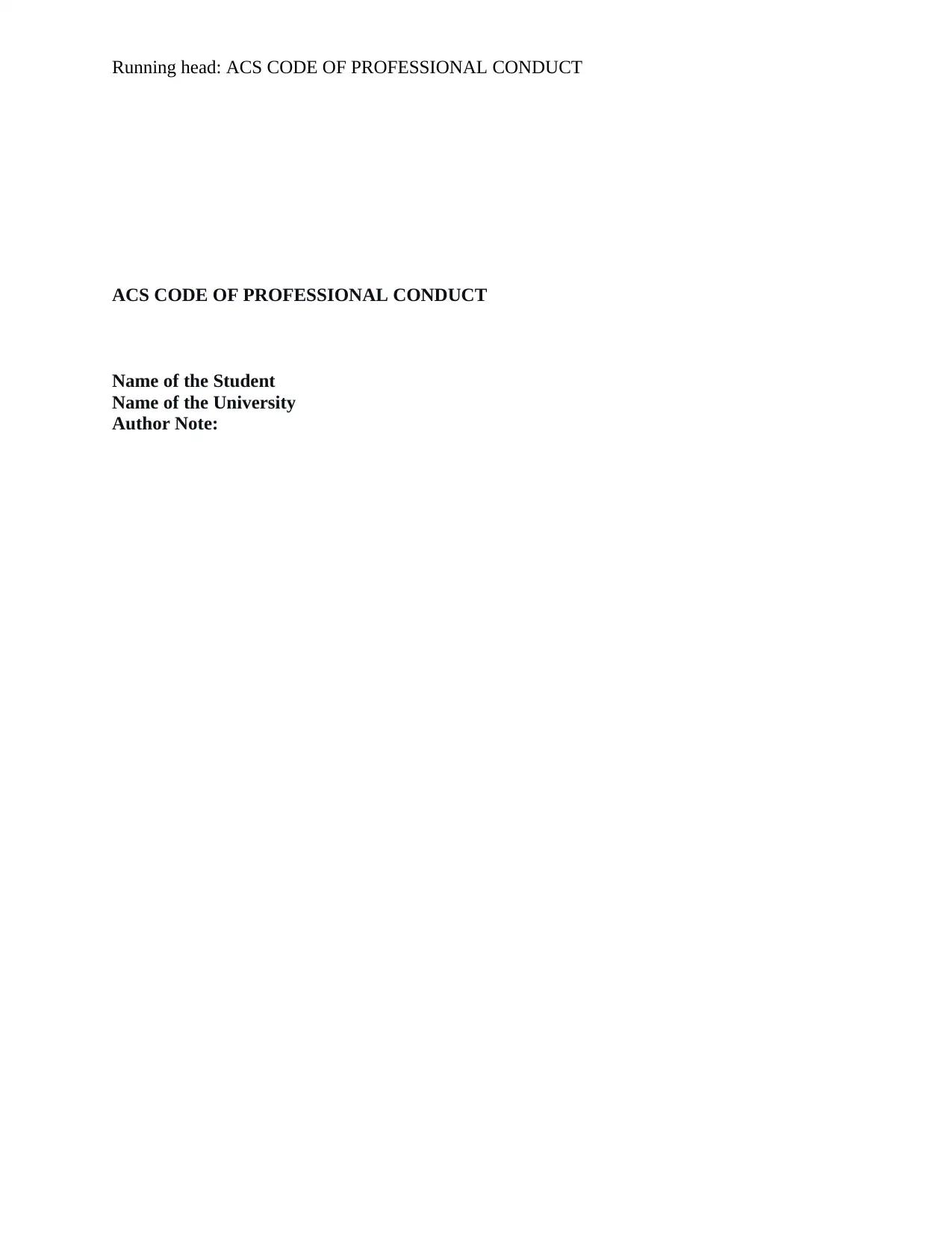
Running head: ACS CODE OF PROFESSIONAL CONDUCT
ACS CODE OF PROFESSIONAL CONDUCT
Name of the Student
Name of the University
Author Note:
ACS CODE OF PROFESSIONAL CONDUCT
Name of the Student
Name of the University
Author Note:
Paraphrase This Document
Need a fresh take? Get an instant paraphrase of this document with our AI Paraphraser
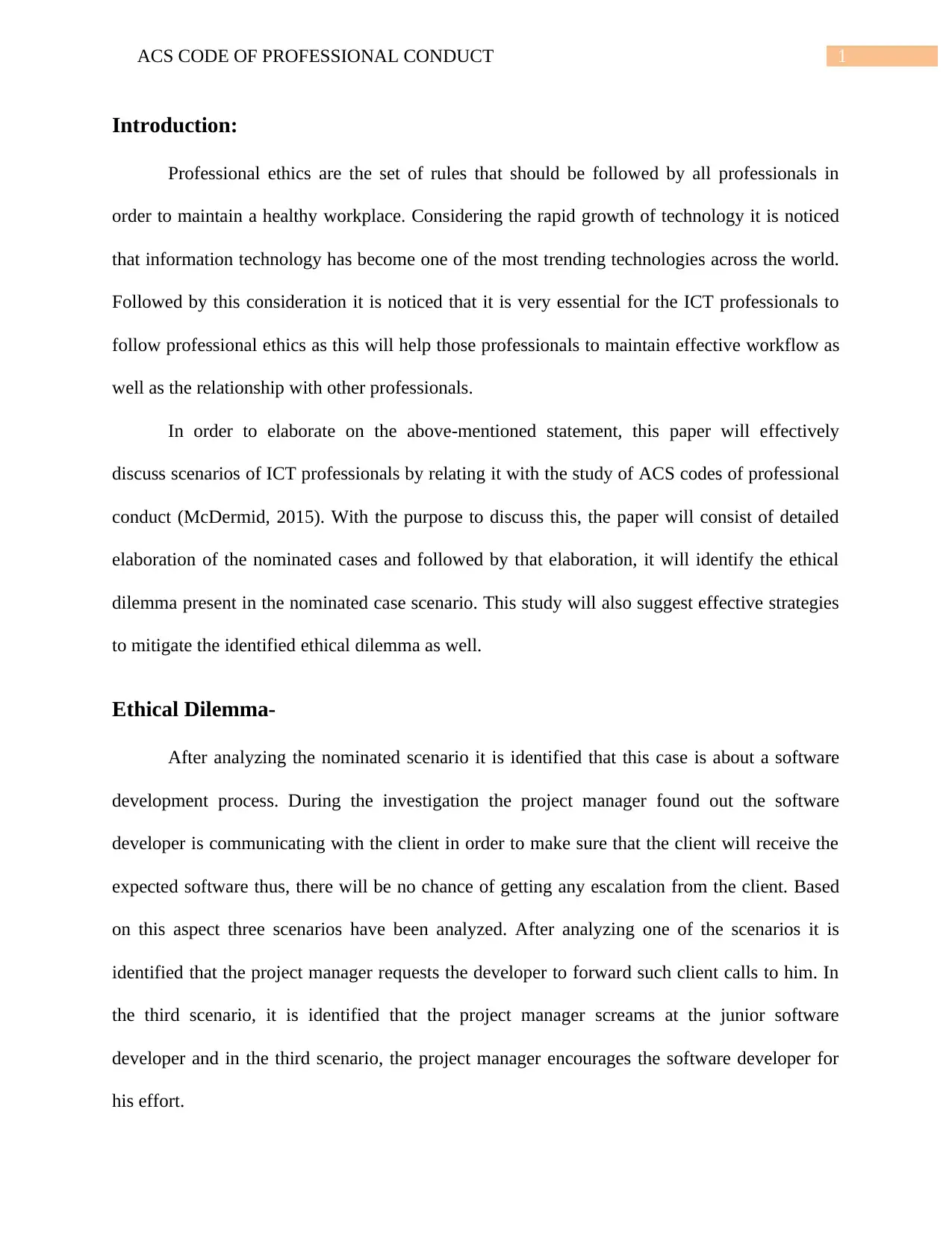
1ACS CODE OF PROFESSIONAL CONDUCT
Introduction:
Professional ethics are the set of rules that should be followed by all professionals in
order to maintain a healthy workplace. Considering the rapid growth of technology it is noticed
that information technology has become one of the most trending technologies across the world.
Followed by this consideration it is noticed that it is very essential for the ICT professionals to
follow professional ethics as this will help those professionals to maintain effective workflow as
well as the relationship with other professionals.
In order to elaborate on the above-mentioned statement, this paper will effectively
discuss scenarios of ICT professionals by relating it with the study of ACS codes of professional
conduct (McDermid, 2015). With the purpose to discuss this, the paper will consist of detailed
elaboration of the nominated cases and followed by that elaboration, it will identify the ethical
dilemma present in the nominated case scenario. This study will also suggest effective strategies
to mitigate the identified ethical dilemma as well.
Ethical Dilemma-
After analyzing the nominated scenario it is identified that this case is about a software
development process. During the investigation the project manager found out the software
developer is communicating with the client in order to make sure that the client will receive the
expected software thus, there will be no chance of getting any escalation from the client. Based
on this aspect three scenarios have been analyzed. After analyzing one of the scenarios it is
identified that the project manager requests the developer to forward such client calls to him. In
the third scenario, it is identified that the project manager screams at the junior software
developer and in the third scenario, the project manager encourages the software developer for
his effort.
Introduction:
Professional ethics are the set of rules that should be followed by all professionals in
order to maintain a healthy workplace. Considering the rapid growth of technology it is noticed
that information technology has become one of the most trending technologies across the world.
Followed by this consideration it is noticed that it is very essential for the ICT professionals to
follow professional ethics as this will help those professionals to maintain effective workflow as
well as the relationship with other professionals.
In order to elaborate on the above-mentioned statement, this paper will effectively
discuss scenarios of ICT professionals by relating it with the study of ACS codes of professional
conduct (McDermid, 2015). With the purpose to discuss this, the paper will consist of detailed
elaboration of the nominated cases and followed by that elaboration, it will identify the ethical
dilemma present in the nominated case scenario. This study will also suggest effective strategies
to mitigate the identified ethical dilemma as well.
Ethical Dilemma-
After analyzing the nominated scenario it is identified that this case is about a software
development process. During the investigation the project manager found out the software
developer is communicating with the client in order to make sure that the client will receive the
expected software thus, there will be no chance of getting any escalation from the client. Based
on this aspect three scenarios have been analyzed. After analyzing one of the scenarios it is
identified that the project manager requests the developer to forward such client calls to him. In
the third scenario, it is identified that the project manager screams at the junior software
developer and in the third scenario, the project manager encourages the software developer for
his effort.
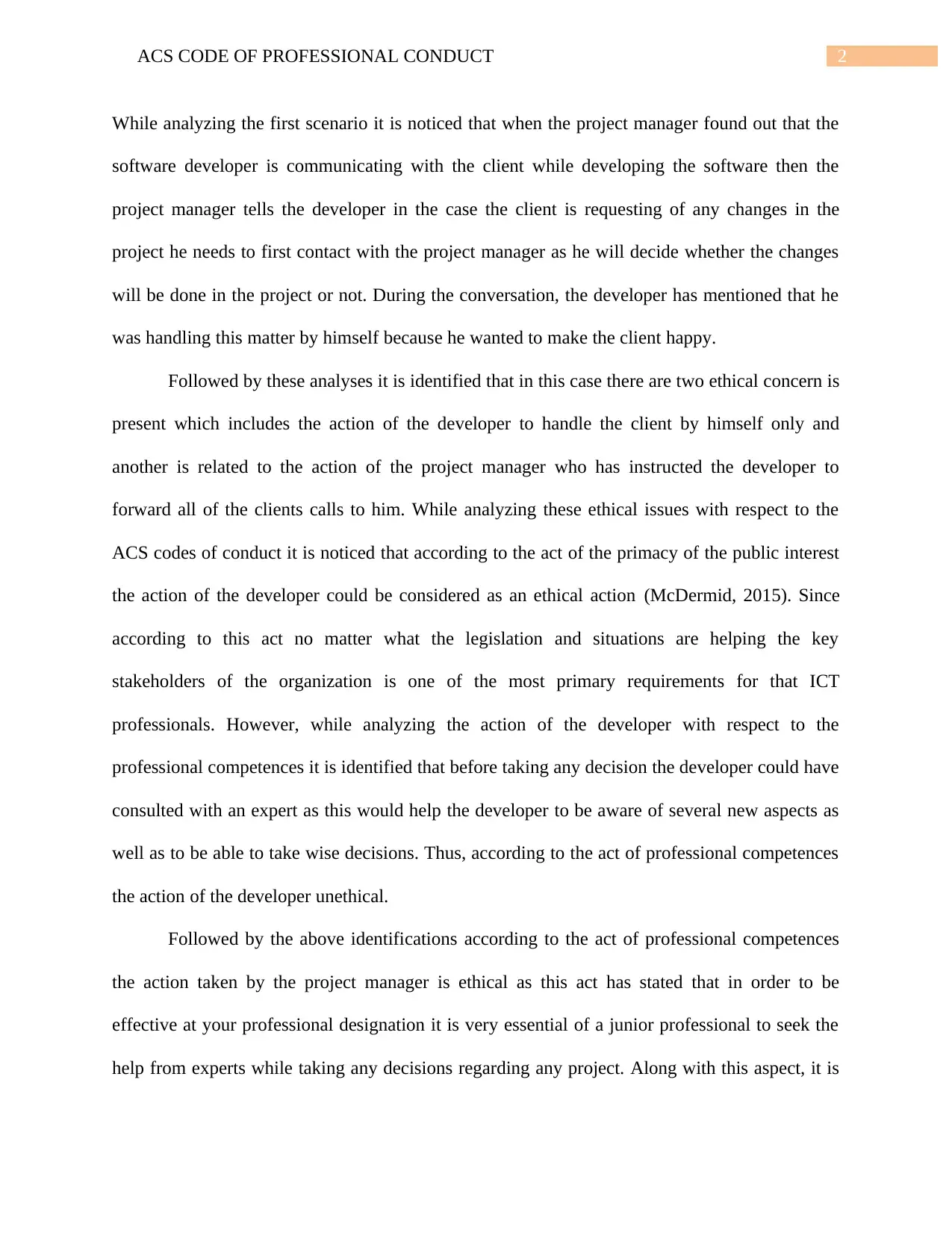
2ACS CODE OF PROFESSIONAL CONDUCT
While analyzing the first scenario it is noticed that when the project manager found out that the
software developer is communicating with the client while developing the software then the
project manager tells the developer in the case the client is requesting of any changes in the
project he needs to first contact with the project manager as he will decide whether the changes
will be done in the project or not. During the conversation, the developer has mentioned that he
was handling this matter by himself because he wanted to make the client happy.
Followed by these analyses it is identified that in this case there are two ethical concern is
present which includes the action of the developer to handle the client by himself only and
another is related to the action of the project manager who has instructed the developer to
forward all of the clients calls to him. While analyzing these ethical issues with respect to the
ACS codes of conduct it is noticed that according to the act of the primacy of the public interest
the action of the developer could be considered as an ethical action (McDermid, 2015). Since
according to this act no matter what the legislation and situations are helping the key
stakeholders of the organization is one of the most primary requirements for that ICT
professionals. However, while analyzing the action of the developer with respect to the
professional competences it is identified that before taking any decision the developer could have
consulted with an expert as this would help the developer to be aware of several new aspects as
well as to be able to take wise decisions. Thus, according to the act of professional competences
the action of the developer unethical.
Followed by the above identifications according to the act of professional competences
the action taken by the project manager is ethical as this act has stated that in order to be
effective at your professional designation it is very essential of a junior professional to seek the
help from experts while taking any decisions regarding any project. Along with this aspect, it is
While analyzing the first scenario it is noticed that when the project manager found out that the
software developer is communicating with the client while developing the software then the
project manager tells the developer in the case the client is requesting of any changes in the
project he needs to first contact with the project manager as he will decide whether the changes
will be done in the project or not. During the conversation, the developer has mentioned that he
was handling this matter by himself because he wanted to make the client happy.
Followed by these analyses it is identified that in this case there are two ethical concern is
present which includes the action of the developer to handle the client by himself only and
another is related to the action of the project manager who has instructed the developer to
forward all of the clients calls to him. While analyzing these ethical issues with respect to the
ACS codes of conduct it is noticed that according to the act of the primacy of the public interest
the action of the developer could be considered as an ethical action (McDermid, 2015). Since
according to this act no matter what the legislation and situations are helping the key
stakeholders of the organization is one of the most primary requirements for that ICT
professionals. However, while analyzing the action of the developer with respect to the
professional competences it is identified that before taking any decision the developer could have
consulted with an expert as this would help the developer to be aware of several new aspects as
well as to be able to take wise decisions. Thus, according to the act of professional competences
the action of the developer unethical.
Followed by the above identifications according to the act of professional competences
the action taken by the project manager is ethical as this act has stated that in order to be
effective at your professional designation it is very essential of a junior professional to seek the
help from experts while taking any decisions regarding any project. Along with this aspect, it is
⊘ This is a preview!⊘
Do you want full access?
Subscribe today to unlock all pages.

Trusted by 1+ million students worldwide
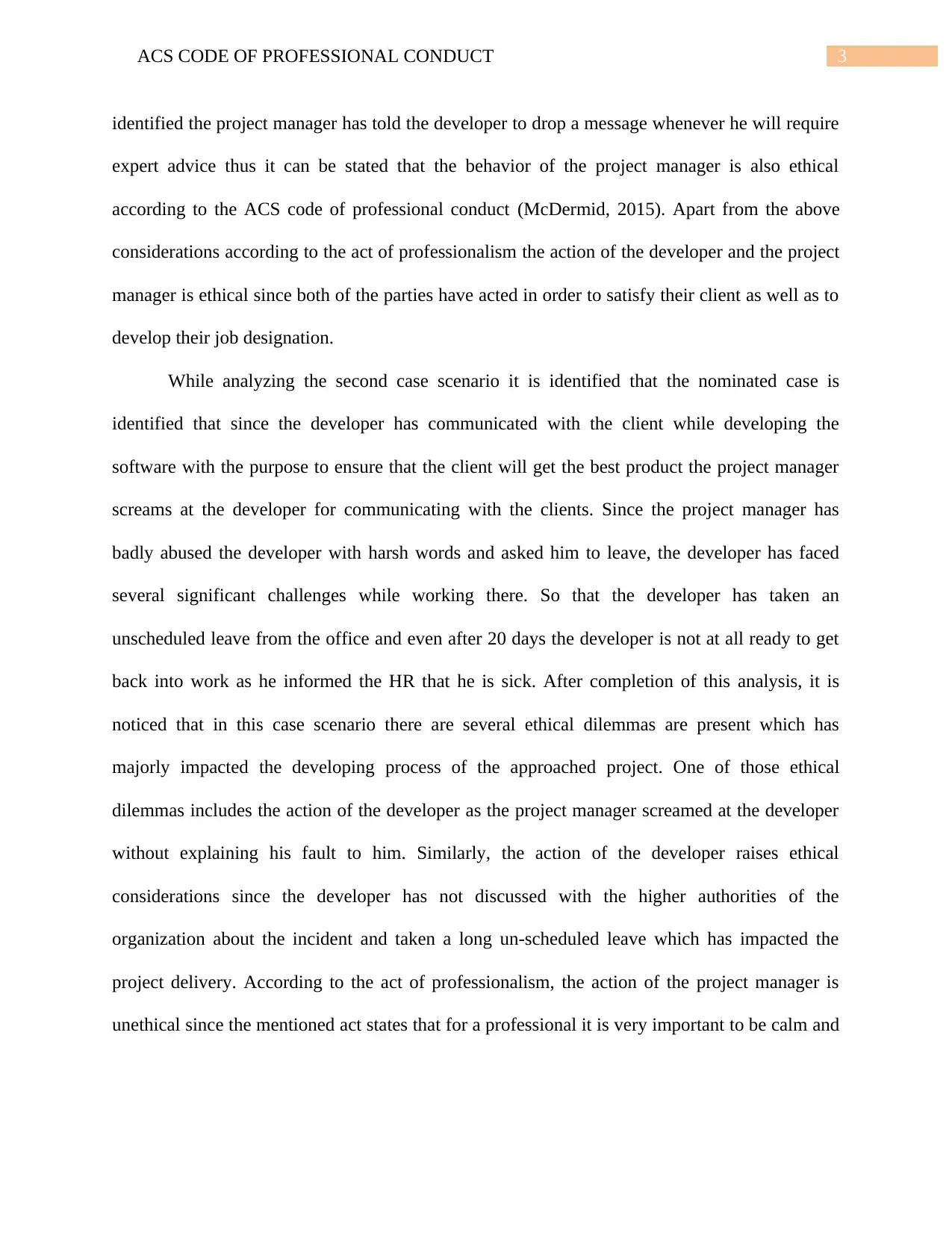
3ACS CODE OF PROFESSIONAL CONDUCT
identified the project manager has told the developer to drop a message whenever he will require
expert advice thus it can be stated that the behavior of the project manager is also ethical
according to the ACS code of professional conduct (McDermid, 2015). Apart from the above
considerations according to the act of professionalism the action of the developer and the project
manager is ethical since both of the parties have acted in order to satisfy their client as well as to
develop their job designation.
While analyzing the second case scenario it is identified that the nominated case is
identified that since the developer has communicated with the client while developing the
software with the purpose to ensure that the client will get the best product the project manager
screams at the developer for communicating with the clients. Since the project manager has
badly abused the developer with harsh words and asked him to leave, the developer has faced
several significant challenges while working there. So that the developer has taken an
unscheduled leave from the office and even after 20 days the developer is not at all ready to get
back into work as he informed the HR that he is sick. After completion of this analysis, it is
noticed that in this case scenario there are several ethical dilemmas are present which has
majorly impacted the developing process of the approached project. One of those ethical
dilemmas includes the action of the developer as the project manager screamed at the developer
without explaining his fault to him. Similarly, the action of the developer raises ethical
considerations since the developer has not discussed with the higher authorities of the
organization about the incident and taken a long un-scheduled leave which has impacted the
project delivery. According to the act of professionalism, the action of the project manager is
unethical since the mentioned act states that for a professional it is very important to be calm and
identified the project manager has told the developer to drop a message whenever he will require
expert advice thus it can be stated that the behavior of the project manager is also ethical
according to the ACS code of professional conduct (McDermid, 2015). Apart from the above
considerations according to the act of professionalism the action of the developer and the project
manager is ethical since both of the parties have acted in order to satisfy their client as well as to
develop their job designation.
While analyzing the second case scenario it is identified that the nominated case is
identified that since the developer has communicated with the client while developing the
software with the purpose to ensure that the client will get the best product the project manager
screams at the developer for communicating with the clients. Since the project manager has
badly abused the developer with harsh words and asked him to leave, the developer has faced
several significant challenges while working there. So that the developer has taken an
unscheduled leave from the office and even after 20 days the developer is not at all ready to get
back into work as he informed the HR that he is sick. After completion of this analysis, it is
noticed that in this case scenario there are several ethical dilemmas are present which has
majorly impacted the developing process of the approached project. One of those ethical
dilemmas includes the action of the developer as the project manager screamed at the developer
without explaining his fault to him. Similarly, the action of the developer raises ethical
considerations since the developer has not discussed with the higher authorities of the
organization about the incident and taken a long un-scheduled leave which has impacted the
project delivery. According to the act of professionalism, the action of the project manager is
unethical since the mentioned act states that for a professional it is very important to be calm and
Paraphrase This Document
Need a fresh take? Get an instant paraphrase of this document with our AI Paraphraser
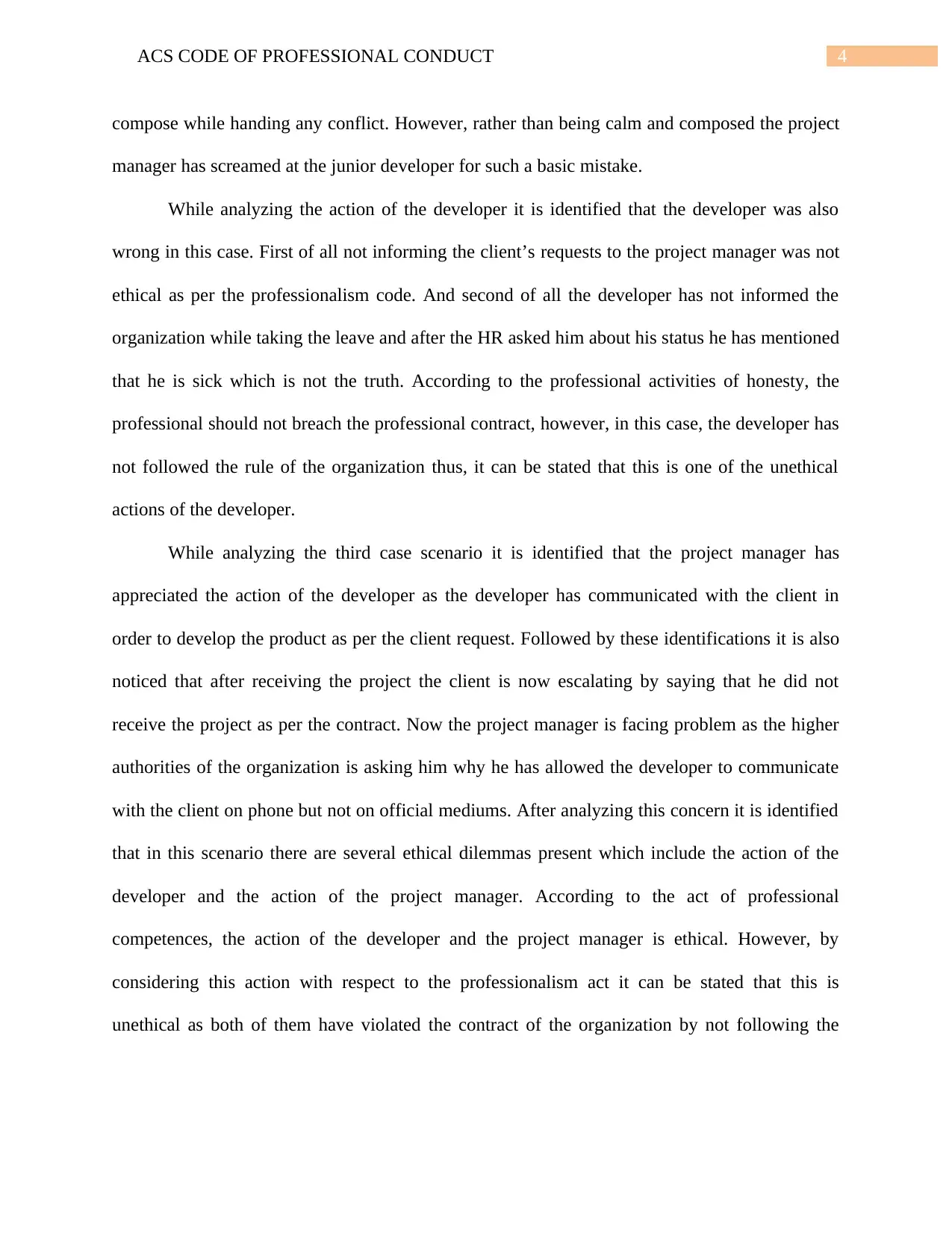
4ACS CODE OF PROFESSIONAL CONDUCT
compose while handing any conflict. However, rather than being calm and composed the project
manager has screamed at the junior developer for such a basic mistake.
While analyzing the action of the developer it is identified that the developer was also
wrong in this case. First of all not informing the client’s requests to the project manager was not
ethical as per the professionalism code. And second of all the developer has not informed the
organization while taking the leave and after the HR asked him about his status he has mentioned
that he is sick which is not the truth. According to the professional activities of honesty, the
professional should not breach the professional contract, however, in this case, the developer has
not followed the rule of the organization thus, it can be stated that this is one of the unethical
actions of the developer.
While analyzing the third case scenario it is identified that the project manager has
appreciated the action of the developer as the developer has communicated with the client in
order to develop the product as per the client request. Followed by these identifications it is also
noticed that after receiving the project the client is now escalating by saying that he did not
receive the project as per the contract. Now the project manager is facing problem as the higher
authorities of the organization is asking him why he has allowed the developer to communicate
with the client on phone but not on official mediums. After analyzing this concern it is identified
that in this scenario there are several ethical dilemmas present which include the action of the
developer and the action of the project manager. According to the act of professional
competences, the action of the developer and the project manager is ethical. However, by
considering this action with respect to the professionalism act it can be stated that this is
unethical as both of them have violated the contract of the organization by not following the
compose while handing any conflict. However, rather than being calm and composed the project
manager has screamed at the junior developer for such a basic mistake.
While analyzing the action of the developer it is identified that the developer was also
wrong in this case. First of all not informing the client’s requests to the project manager was not
ethical as per the professionalism code. And second of all the developer has not informed the
organization while taking the leave and after the HR asked him about his status he has mentioned
that he is sick which is not the truth. According to the professional activities of honesty, the
professional should not breach the professional contract, however, in this case, the developer has
not followed the rule of the organization thus, it can be stated that this is one of the unethical
actions of the developer.
While analyzing the third case scenario it is identified that the project manager has
appreciated the action of the developer as the developer has communicated with the client in
order to develop the product as per the client request. Followed by these identifications it is also
noticed that after receiving the project the client is now escalating by saying that he did not
receive the project as per the contract. Now the project manager is facing problem as the higher
authorities of the organization is asking him why he has allowed the developer to communicate
with the client on phone but not on official mediums. After analyzing this concern it is identified
that in this scenario there are several ethical dilemmas present which include the action of the
developer and the action of the project manager. According to the act of professional
competences, the action of the developer and the project manager is ethical. However, by
considering this action with respect to the professionalism act it can be stated that this is
unethical as both of them have violated the contract of the organization by not following the
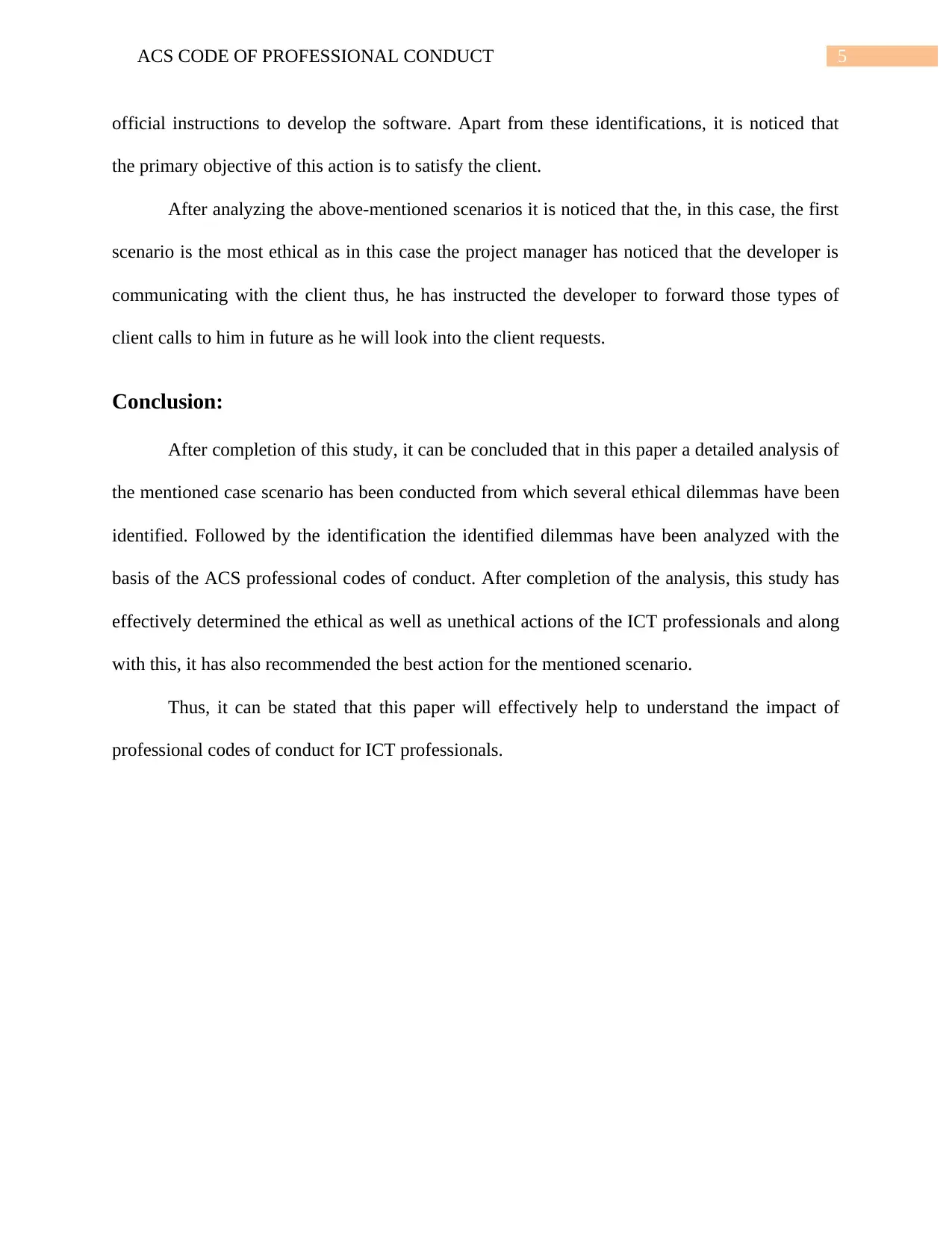
5ACS CODE OF PROFESSIONAL CONDUCT
official instructions to develop the software. Apart from these identifications, it is noticed that
the primary objective of this action is to satisfy the client.
After analyzing the above-mentioned scenarios it is noticed that the, in this case, the first
scenario is the most ethical as in this case the project manager has noticed that the developer is
communicating with the client thus, he has instructed the developer to forward those types of
client calls to him in future as he will look into the client requests.
Conclusion:
After completion of this study, it can be concluded that in this paper a detailed analysis of
the mentioned case scenario has been conducted from which several ethical dilemmas have been
identified. Followed by the identification the identified dilemmas have been analyzed with the
basis of the ACS professional codes of conduct. After completion of the analysis, this study has
effectively determined the ethical as well as unethical actions of the ICT professionals and along
with this, it has also recommended the best action for the mentioned scenario.
Thus, it can be stated that this paper will effectively help to understand the impact of
professional codes of conduct for ICT professionals.
official instructions to develop the software. Apart from these identifications, it is noticed that
the primary objective of this action is to satisfy the client.
After analyzing the above-mentioned scenarios it is noticed that the, in this case, the first
scenario is the most ethical as in this case the project manager has noticed that the developer is
communicating with the client thus, he has instructed the developer to forward those types of
client calls to him in future as he will look into the client requests.
Conclusion:
After completion of this study, it can be concluded that in this paper a detailed analysis of
the mentioned case scenario has been conducted from which several ethical dilemmas have been
identified. Followed by the identification the identified dilemmas have been analyzed with the
basis of the ACS professional codes of conduct. After completion of the analysis, this study has
effectively determined the ethical as well as unethical actions of the ICT professionals and along
with this, it has also recommended the best action for the mentioned scenario.
Thus, it can be stated that this paper will effectively help to understand the impact of
professional codes of conduct for ICT professionals.
⊘ This is a preview!⊘
Do you want full access?
Subscribe today to unlock all pages.

Trusted by 1+ million students worldwide
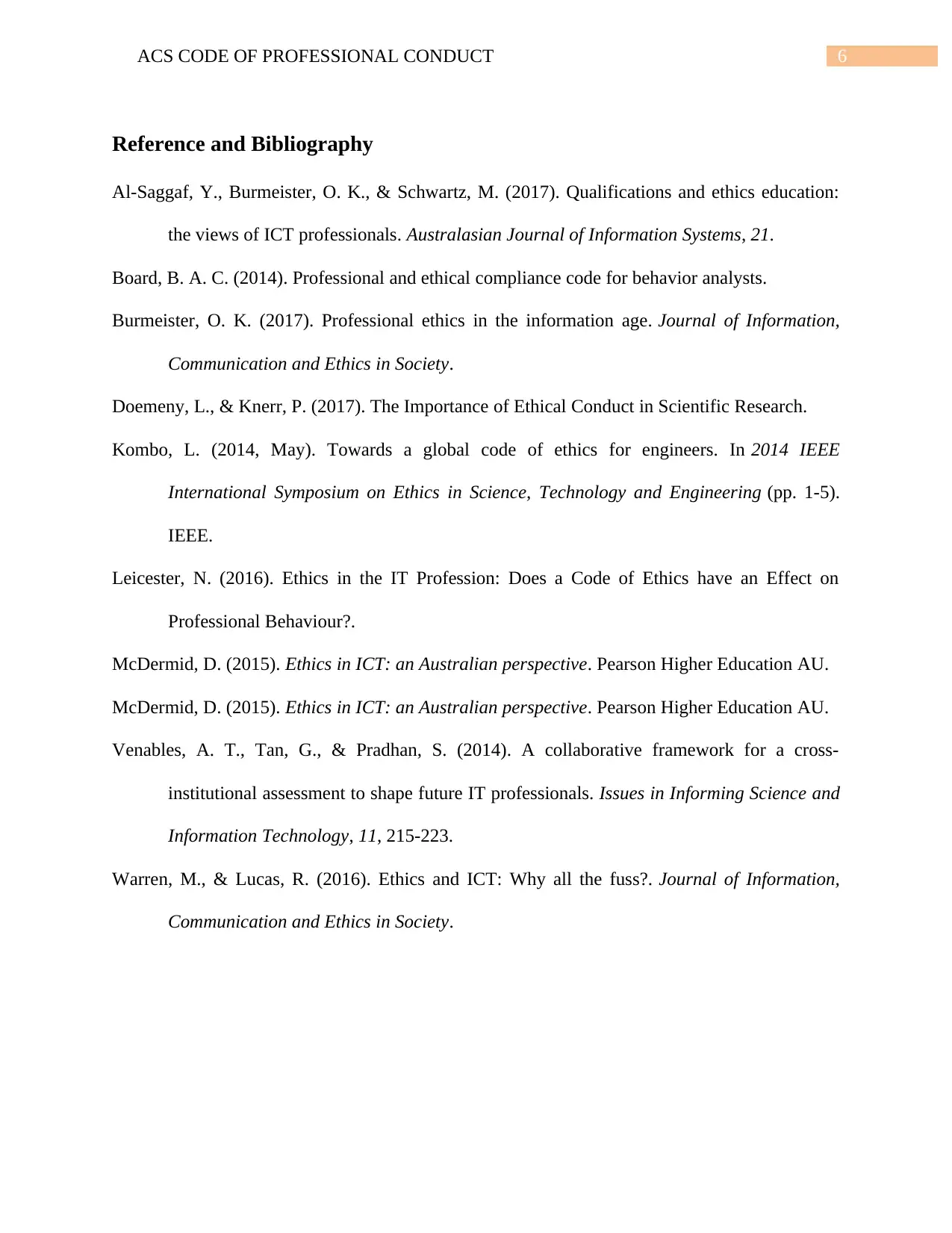
6ACS CODE OF PROFESSIONAL CONDUCT
Reference and Bibliography
Al-Saggaf, Y., Burmeister, O. K., & Schwartz, M. (2017). Qualifications and ethics education:
the views of ICT professionals. Australasian Journal of Information Systems, 21.
Board, B. A. C. (2014). Professional and ethical compliance code for behavior analysts.
Burmeister, O. K. (2017). Professional ethics in the information age. Journal of Information,
Communication and Ethics in Society.
Doemeny, L., & Knerr, P. (2017). The Importance of Ethical Conduct in Scientific Research.
Kombo, L. (2014, May). Towards a global code of ethics for engineers. In 2014 IEEE
International Symposium on Ethics in Science, Technology and Engineering (pp. 1-5).
IEEE.
Leicester, N. (2016). Ethics in the IT Profession: Does a Code of Ethics have an Effect on
Professional Behaviour?.
McDermid, D. (2015). Ethics in ICT: an Australian perspective. Pearson Higher Education AU.
McDermid, D. (2015). Ethics in ICT: an Australian perspective. Pearson Higher Education AU.
Venables, A. T., Tan, G., & Pradhan, S. (2014). A collaborative framework for a cross-
institutional assessment to shape future IT professionals. Issues in Informing Science and
Information Technology, 11, 215-223.
Warren, M., & Lucas, R. (2016). Ethics and ICT: Why all the fuss?. Journal of Information,
Communication and Ethics in Society.
Reference and Bibliography
Al-Saggaf, Y., Burmeister, O. K., & Schwartz, M. (2017). Qualifications and ethics education:
the views of ICT professionals. Australasian Journal of Information Systems, 21.
Board, B. A. C. (2014). Professional and ethical compliance code for behavior analysts.
Burmeister, O. K. (2017). Professional ethics in the information age. Journal of Information,
Communication and Ethics in Society.
Doemeny, L., & Knerr, P. (2017). The Importance of Ethical Conduct in Scientific Research.
Kombo, L. (2014, May). Towards a global code of ethics for engineers. In 2014 IEEE
International Symposium on Ethics in Science, Technology and Engineering (pp. 1-5).
IEEE.
Leicester, N. (2016). Ethics in the IT Profession: Does a Code of Ethics have an Effect on
Professional Behaviour?.
McDermid, D. (2015). Ethics in ICT: an Australian perspective. Pearson Higher Education AU.
McDermid, D. (2015). Ethics in ICT: an Australian perspective. Pearson Higher Education AU.
Venables, A. T., Tan, G., & Pradhan, S. (2014). A collaborative framework for a cross-
institutional assessment to shape future IT professionals. Issues in Informing Science and
Information Technology, 11, 215-223.
Warren, M., & Lucas, R. (2016). Ethics and ICT: Why all the fuss?. Journal of Information,
Communication and Ethics in Society.
1 out of 7
Related Documents
Your All-in-One AI-Powered Toolkit for Academic Success.
+13062052269
info@desklib.com
Available 24*7 on WhatsApp / Email
![[object Object]](/_next/static/media/star-bottom.7253800d.svg)
Unlock your academic potential
Copyright © 2020–2026 A2Z Services. All Rights Reserved. Developed and managed by ZUCOL.





